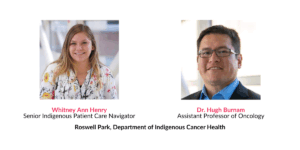November is Native American Heritage Month, a time to recognize the history, culture, and contributions of Native Americans, as well as misconceptions and their impact on Natives’ health and sense of community. In this feature, community leaders reflect on their personal and professional experiences, offering powerful insights into the importance of cultural awareness and representation in Western New York. Continue reading to explore how respect for Indigenous identity strengthens and builds trust, deepens care, and honors the lived experiences of Native peoples.

What are some common misconceptions about Native American cultures that you’d like to address?
“The biggest misconception that I would like to address is that although there are a lot of similarities, each Nation and Tribe is unique. Each tribe has their own language, different traditional foods based on their geographic location, different tribal governments, to name a few.” – Whitney
How are younger generations engaging with their heritage?
“There’s been more traditional programming for the younger generations which allows for the youth to connect with elders and community members; language camps, plant medicine walks, canning classes.” – Whitney
From your perspective, how has the history of colonization continued to impact Native communities today?
“There is a lot of mistrust in the different systems and from a patient navigation perspective, there is still mistrust in the medical systems. That is why we have patient navigators from Indigenous communities to help reduce barriers to cancer care.” – Whitney
What are some of the unique mental health challenges faced by Native communities today?
“Some unique mental health challenges faced by Native communities today are that we live in much more of a secluded, individual world as opposed to a communal one- one where we were often together. Colonization factors and today’s technology, have disrupted our view on community. These have also disrupted our view on what it means to be individual tribal nations, and now we are forced to live within silos a little more. For example, maybe there’s more prevalence on individual achievement, as opposed to thinking about the community, community wealth, and community perspectives. There’s more focus on the nuclear family as opposed to the larger community, and because we are more individual, we tend to lose the community aspect, and mental health is impacted by that loss.” – Dr. Hugh
What message of hope or healing would you share with someone struggling in silence?
“That you are not alone and you are loved.” – Whitney
*This conversation reminds us that Native American awareness is not just about history—it’s about honoring present-day voices, experiences, and resilience. From addressing misconceptions to uplifting younger generations and navigating systemic challenges, the insights shared here reflect the importance of working collaboratively to support our local Native American communities.*
As a behavioral health organization, Horizon is committed to serving all of our communities. Click here to learn more about our Stronger Together Commitment.
If you or a loved on is in need of support, Horizon is here to help. Contact us today at 716-831-1800 to get connected to our trained professionals.